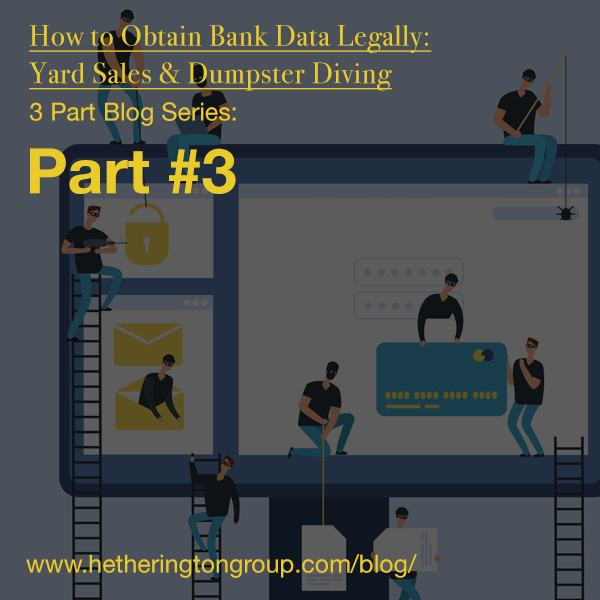By Cynthia Hetherington, MLS, MSM, CFE, CII

It’s no secret that bank account information isn’t as accessible to legal professionals, credentialed investigators, and asset due diligence researchers as other personal information. If it were merely expensive or inconvenient to obtain this information, professional information aggregators such as LexisNexis and Thomson Reuters would be able to hawk asset databases at their conference vendor booths, and we’d all be lining up in droves to subscribe.
After all, nothing tells a story like someone’s financial information. But at times, it can feel like trying to find a needle in a haystack.
In this final of our 3-part series, we share the means and methods Hg’s expert investigative analysts employ when trying to track down financial data related to bank accounts. This week, we look at yard sales, bankruptcy, and dumpster diving, among others!
Blanket Levy
A blanket levy involves serving a Writ of Execution and a Bank Levy on every bank in the area. This procedure assumes that you will hit an account eventually and that the subject will bank within only a few miles’ radius of his/her home or work. It is rumored that the IRS has used this tactic in the past. Obviously, this technique will work best in a small town.
Employer
If you know the subject’s employer, you may consider serving a Business Record Subpoena on the employer to obtain a copy of a payroll check the subject has cashed. The check should have the subject’s account number, and possibly the name of the bank, on the back of it.
Trash Search
Federal agents, local law enforcement, and especially private investigators often conduct trash searches. After picking through the discarded coffee grinds and advertising mailers, you may locate bank statements, receipts, and other great information—which just might reveal the bank where the subject has an account.
If you need that convincing dumpster diving is legal, author and private investigator, Scott Fulmer, gives you the dirt in his Pursuit Magazine article, Garbology 101: Trash Pull Tips for Private Investigators:
“In the 1988 U.S. Supreme Court case of California v. Greenwood (486 U.S. 35), the court held 6 to 2 that the Fourth Amendment does not prohibit a search and seizure of garbage left for collection outside the curtilage of a home.”
Fulmer recommends contacting an attorney, should you have municipality and/or housing complex-oriented questions. For example, Oregon does not follow the federal ruling.
Yard Sales (Real-time and Virtual)
If your subject has frequent yard sales or if the town he lives in has a town-wide yard sale, be sure to stop buy and take inventory of all the things being sold. The assets being sold in the yard can be indicative of the remaining items in the house. Be sure to pay for items bought at the sale with a check. What if the yard sale is virtual? Often with online sites, you can offer to make purchases but make sure you pay by check.
State Sales Tax Permits
The application for a Sales Tax permit requires that the business list its bank account.
Bankruptcy Filings
If the subject filed for bankruptcy, there likely won’t be much left behind. However, any assets they did have will be listed on their bankruptcy filing, which can be found on the PACER website. The creditor information, or person owed, with amounts owed and account information affiliated to it will be listed. You’ll often find that once a bankruptcy clears, the subject tends to go back to the same lenders for more credit.
Divorce Records, and Community Property Settlement
These records often contain a wealth of financial information, including the name and number of checking, savings, brokers, stocks, credit cards, and bonds accounts. The description and address of private property, plus the make, model, and license number of vehicles are also included in the divisions of property papers.
Judgment
The easiest way to access bank account information? Have a judgment filed against the party. You can walk into any bank and show them that judgment. If your subject has an account there, you have a right to the information, to put a lien against it, or to seize it altogether.
In summary, investigators, attorneys, accountants, and auditors have a plethora of legal means to locate bank accounts legally. There is no reason to skirt the law in your search for hidden accounts and hidden assets.

Are you an analyst or investigator looking for advanced #OSINT training ? If so, check out Hg’s webinar series, where you can attend live sessions and receive CEUs or watch previously recorded sessions to beef up your investigative skills.

Are you interested in working with an international company but unsure if it’s legitimate? As veteran investigators in global due diligence, Hg understands the business world and the legal and regulatory frameworks in which corporations and privately held companies operate. Our skilled analysts excel at exposing financial risks, reputational issues, criminal activity, and legal actions detrimental to your personal and business stability. Learn how our team can arm you with the data you need.
 Cynthia Hetherington, MLS, MSM, CFE, CII is the founder and president of Hetherington Group, a consulting, publishing, and training firm that leads in due diligence, corporate intelligence, and cyber investigations by keeping pace with the latest security threats and assessments. She has authored three books on how to conduct investigations, is the publisher of the newsletter, Data2know: Internet and Online Intelligence, and annually trains thousands of investigators, security professionals, attorneys, accountants, auditors, military intelligence professionals, and federal, state, and local agencies on best practices in the public and private sectors.
Cynthia Hetherington, MLS, MSM, CFE, CII is the founder and president of Hetherington Group, a consulting, publishing, and training firm that leads in due diligence, corporate intelligence, and cyber investigations by keeping pace with the latest security threats and assessments. She has authored three books on how to conduct investigations, is the publisher of the newsletter, Data2know: Internet and Online Intelligence, and annually trains thousands of investigators, security professionals, attorneys, accountants, auditors, military intelligence professionals, and federal, state, and local agencies on best practices in the public and private sectors.



